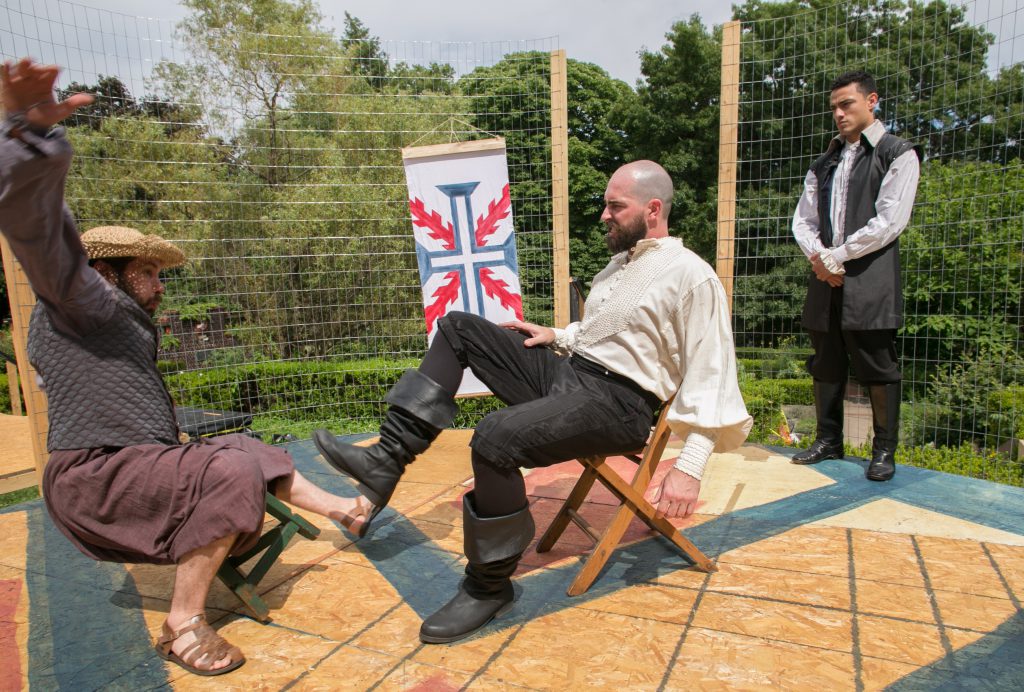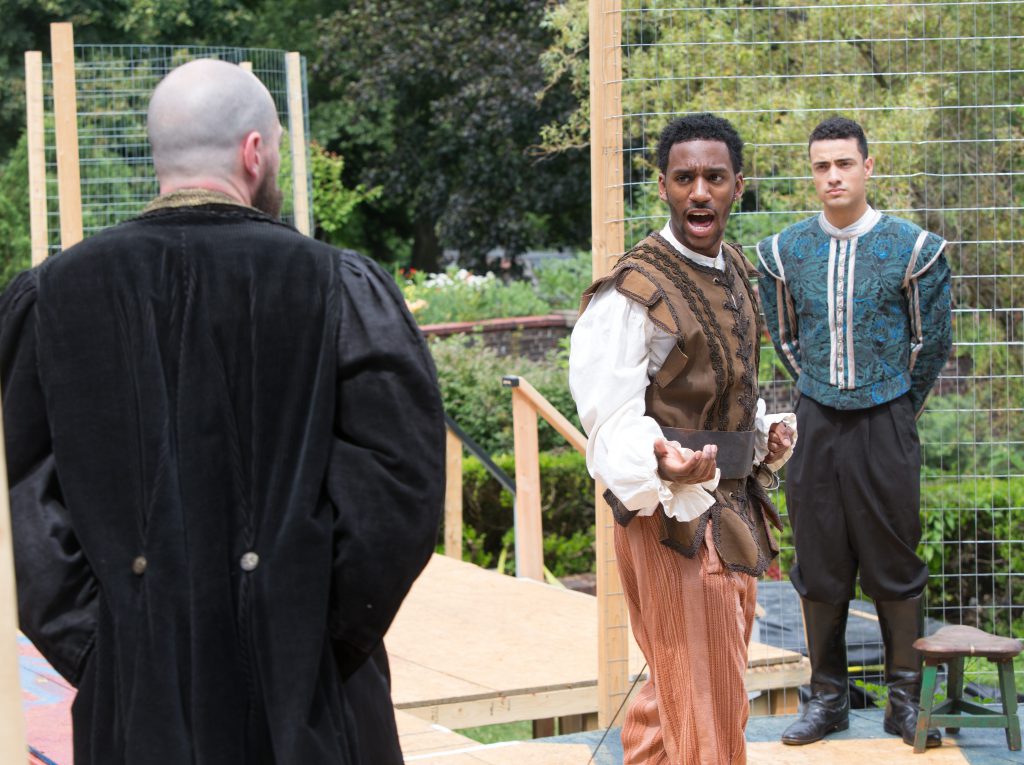Quantum Theatre Stages 17th-Century Spanish Playwright Lope de Vega’s ‘Peribáñez’

Siddiq Saunderson (Peribáñez), Isabel Pask (Casilda), David Bielewicz (Benito), Amanda Pulcini (Costanzo), Sol Crespo (Iñes), Ricardo Vila-Roger (Priest), and Freddy Miyares (Gil) enjoying the wedding celebration.
Most great plays are successful because they are entertaining and relatable. Case in point is Quantum Theatre’s production of the Spanish playwight Félix Lope de Vega y Carpio’s Peribáñez. Chronicling the human condition and touching on elements of love, honor, honesty, jealousy, humor, power, and poverty, Peribáñez‘s plot could easily be a modern-day movie or even a soap opera.
An Interesting Playwright
Lope de Vega acquired knowledge in many different areas of life. He was born in Madrid in 1562. A gifted student, he was educated in a school run by poet and musician Vicente Espinel, and then by the Jesuits and a bishop. He was on the path to becoming a priest when he fell in love and realized that a celibate life was not for him. After serving in the Spanish navy, Lope de Vega turned to writing plays, poetry, and novels. With many love affairs, scandals, and tragedies, he no doubt had plenty of material on which to base his plays. In 1614, at the age of 51, Lope de Vega finally joined the priesthood.
He was a prolific and quick-paced writer who authored over 3,500 individual pieces, some completed in less than 24 hours for demanding patrons. Lope de Vega is also recognized for creating such masterworks as The Dog in the Manger, The Widow from Valencia, and The Dance Teacher. Spanish history, religion, mid-level nobility, and everyday peasants were recurring threads in his tales. Many of his plays were written in an innovative three-act comedia style. Lope de Vega was a contemporary of England’s William Shakespeare.
The Power of Love, and Jealousy
The foundation for Peribáñez is the seemingly boundless love between a newly married couple—a peasant farmer named Peribáñez (Siddiq Saunderson) and his beautiful wife Casilda (Isabel Pask). The play opens with a wedding reception scene with the bride and groom, friends, and the priest. The celebration is going merrily along with guitar music and people singing. The bride and groom share exclamations of their love. Peribáñez states his love for Casilda “is greater than the miracle of wheat in the summer,” and she replies that her love for him is “like muscles aching from smiling happiness, or Easter cake with marzipan on it.” Their proclamations of love continue humorously for several minutes with both Saunderson and Pask beaming in full animation.
Peribáñez is dressed in what almost looks like a gaucho-style outfit with a round black hat. Casilda’s wedding clothes consist of a long, prettily patterned red skirt , white blouse, and somewhat fancy shawl. Her hair is adorned with flowers. Pask’s dimples add to her beauty. Together they make a very good-looking couple.
Everything is going fine until someone runs in to the reception and says a wild bull is on the loose and charging everything and everyone in sight. Then a man injured while trying to recapture the bull is carried into the farmer’s house. He’s unresponsive, and everyone thinks he is near death. The man is a local noble and military man known as the Commander (Mike Mihm). Peribáñez and the others run to seek help, and Casilda is left alone to watch over the seemingly dying Commander. The Commander makes a miraculous recovery, and when he opens his eyes sees Casilda and asks, “Are you an angel?” She responds that she isn’t. The main plot line is set into motion as the love-struck Commander schemes to take Casilda from Peribáñez.

The Commander (Mike Mihm), in frustration, pushes his man servant Lujan (Don DiGiulio) with his foot as Leonardo (Freddy Miyares) looks on.
The Commander hires an artist to secretly paint a picture of Casilda. He also tries to ingratiate himself to the couple with gifts of tapestries and mules, even making Peribáñez a knight, with the hope that he’ll be killed in an upcoming battle. The tall, handsome Commander is usually dressed magnificently in a feathered tri-corner hat, a gold-trimmed dark coat, white shirt, and black riding boots. Many women want to marry him, but he only has eyes for Casilda.
None of his plans work out, so he sends his heart-throb vassal Leonardo (Freddy Miyares) to woo and propose marriage to Casilda’s cousin and close friend Iñes (Sol Crespo). However, Leonardo will only marry her if the Commander performs the wedding, and Iñes wants her cousin, Casilda, involved with the ceremony. Casilda, recovering from the Commander’s unwanted romantic advances, wants nothing to do with him. Peribáñez finds out about the Commander’s deep infatuation, and these factors drive the play toward a very intense climax.

Peribáñez in a lively discussion with the Commander as Leonardo watches.
It’s not all high drama. The supporting cast, especially Crespo ( Iñes, Florez), Don DiGiulio (Lujan), and Amanda Pulcini (Costanza, Helipe), draw laughs from the audience. There’s even a few asides to the crowd accompanied by a switching of the lights during that specific dialogue. There’s also some singing and guitar playing in a few scenes.
All three of the play’s lead actors—Pask, Saunderson, and Mihm—perform wonderfully in their roles, each delivering a strong soliloquy and interacting with the other actors in a smooth, steady manner. Pask and Saunderson are both studying acting at Carnegie Mellon University and are going to London as undergraduates to further their education: Saunderson this fall at the Drama Centre London and Pask next fall at the London Academy of Music and Dramatic Art. Other members of the cast include David Bielewicz, Ethan Saks, and Ricardo Vila-Roger, all playing multiple supporting roles in a fine manner. Co-directors Megan Monaghan Rivas and Tlaloc Rivas keep the fast-paced play on track with everyone hitting their marks. Quantum is performing Peribáñez in a modern adaptation by British playwright Tanya Ronder.
A Sylvan Setting
The performance space is on a hillside in the Jennie King Mellon Rose Garden area on the Beechwood Boulevard side of Mellon Park. It’s nestled between two stands of trees about 80 feet apart, almost like a sunken amphitheater. The stage consists of two circular wooden platforms at both ends, each just above a round of hedges and connected to a rectangular stage in the middle by a short walkway. The various parts of the stage had lightly painted, colorful patterns on them. Actors entered their scene by walking up steps to any of the three stages from the down hill side or at the top of the hill’s central stairway. With the play’s fast pace, it’s a wonder that no one fell while running down the steps or on the walkways. The actors were often very close to the audience which made for an even more enjoyable experience.
The circular parts of the stage were partially enclosed by a wire mesh fence. A simple set of lights were posted on several parts of each enclosure. Larger lights were run above separately from the stage. The audience seating was either front and center or at either end of the circular stages. The seats were cushioned folding chairs.
It was a very pleasant way to spend a Tuesday night, watching a well-acted play outdoors in a beautiful park under the summer sky.
Closing Credits
Perbáñez runs through Aug. 28 with performances and special event packages Wednesday through Sunday nights at 8 p.m. For tickets and more information, visit Quantum Theatre’s website or call (412) 362-1713.
Photos courtesy of Quantum Theatre and John Altdorfer.
Rick Handler is executive producer of Entertainment Central Pittsburgh and enjoys seeing great theater.
Share on Social Media
Follow Entertainment Central
Latest Stories
Sign up for the EC Newsletter







